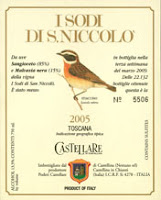
The moment I heard that Duck Soup had a natural wine list I was in there. Two days after opening which was speedy, you have to admit.
Not that they bill themselves as a natural wine bar. In fact they told me they intended to list a few natural wines but as chef Julian Biggs (above) put it "once you start drinking natural wine you can't drink anything else."
It's a tiny no-reservations place with a few tables and a long bar, not unlike the hugely popular Spuntino. There's an interview here with Julian about their philosophy which is (sensibly) to create the kind of place they like to eat in themselves.

I like the way the menu's written on a scruffy piece of paper. I had a gorgeous umami-rich open sandwich topped with fresh girolles (rather than the advertised ceps), lardo and Berkswell cheese which went down nicely with a glass of Frantz Saumon Mineral +.

You can see some of their other wines on the handwritten board.

There was also an amazing earthenware pot of pappa al pomodoro which I got to taste as it cooled, drizzled with olive oil and topped with a couple of shavings of parmesan.

Apparently you can also bring along your own vinyl and they'll play it in the bar.
Another recent addition to the London natural wine scene is Antidote which has opened on the site of the former La Trouvaille in Newburgh Street just off Carnaby Street, under the same management, I think. My husband went along last night and said it was just like a Parisian natural wine bar.
He had some charcuterie and a couple of glasses of wine - La Grange Tiphaine, Bel Air Touraine Amboise and Chateau La Coste 2007, Version Nature, a Cab Merlot blend "not like Bordeaux, but with a southern warmth to it, reminiscent of Bandol". The winemaker is Mathieu Cosse of Cahors.
He was full of praise for the bar which I was slight miffed he managed to get to before me. Ah well, can't be everywhere . . .







